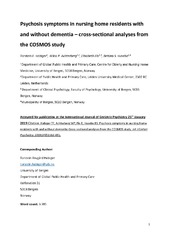Psychosis symptoms in nursing home residents with and without dementia?Cross-sectional analyses from the COSMOS study
Peer reviewed, Journal article
Accepted version
Permanent lenke
https://hdl.handle.net/1956/22126Utgivelsesdato
2019Metadata
Vis full innførselSamlinger
Originalversjon
https://doi.org/10.1002/gps.5067Sammendrag
Objective: To investigate the characteristics of nursing home residents with psychosis and the association with potential underlying factors, such as pain, sleep disturbances, and antipsychotic medication. Method: Five hundred forty‐five residents with and without dementia from 67 Norwegian nursing home units were included in the cross‐sectional analyses. Psychosis was the main outcome measure in our study; other outcome measures include quality of life (QoL), activities of daily living (ADL) function, cognitive function, pain, and antipsychotic medication. Results: One hundred twelve residents had one or more symptoms of psychosis, and compared with residents without psychosis, they had lower QoL (p < 0.001), ADL function (p = 0.003), and cognitive functioning (p = 0.001). Adjusted logistic regression analyses showed that psychosis was associated with the prevalence of pain (OR: 3.19; 95% CI, 1.94‐5.24), sleep disturbances (OR: 4.51; 95% CI, 2.91‐6.99), and total number of medication (OR: 1.10; 95% CI, 1.03‐1.17). Residents with psychosis but without antipsychotic medication had better QoL (p = 0.005) compared with residents receiving any antipsychotics. Conclusion: Psychosis in NH residents is associated with pain, sleep disturbances, and number of medications. Residents with psychosis have poor QoL, although better QoL was observed among those who did not use antipsychotic medication.
